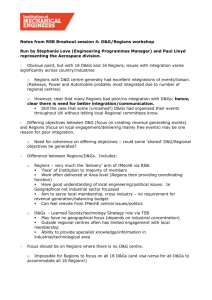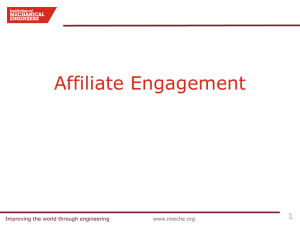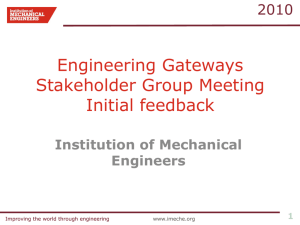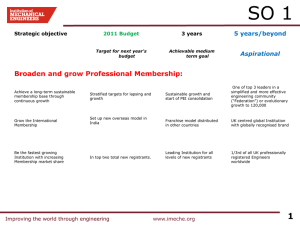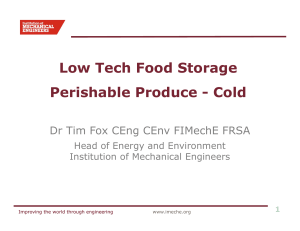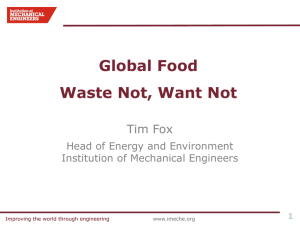1 Food Wastage and Global Food Security
advertisement
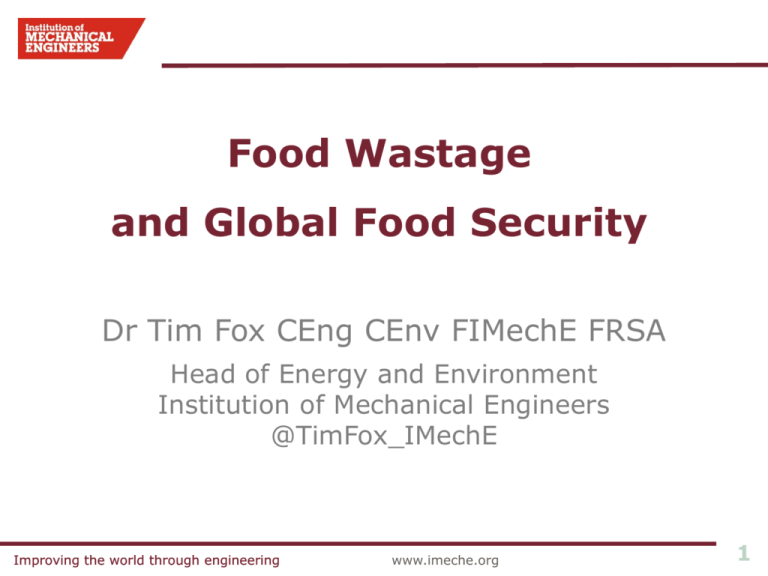
Food Wastage and Global Food Security Dr Tim Fox CEng CEnv FIMechE FRSA Head of Energy and Environment Institution of Mechanical Engineers @TimFox_IMechE Improving the world through engineering www.imeche.org 1 Introduction • Talk Overview Increasing demand Food security Wastage opportunity Perishable priority Engineering sustainable cold What needs to done? Conclusions Improving the world through engineering www.imeche.org 2 Increased global demand • Population growth and demographic change Food – more than double agricultural demand by 2050 Water – global consumption up 30% by 2030 Shelter – 75% of people urban by 2050 (3 billion more) Energy – 40% demand increase by 2035 (90% non-OECD) • Changing tastes Most populous region becoming more affluent, fuelling unprecedented demand for goods and dietary changes • Stresses from climate change & geopolitical tensions Extreme weather, droughts, floods, sea level rise Finite resources and finite usable land Improving the world through engineering www.imeche.org 3 Why engineers? Why IMechE? Food-Water-Energy-Land relationship A defining challenge for the 21st century Improving the world through engineering www.imeche.org 4 Food security • About more than having enough nutritious food • Access, human development and stability Individual and Community: key enabler for route out of poverty and mechanism to increase human well-being National: well-being of citizens and stability of state International: reduction of geopolitical tensions • Sustainable food security Enhances water and energy security, reduces land-use tensions as well as environmental degradation and risk T Improving the world through engineering www.imeche.org 5 Food wastage opportunity Increased production and/or wastage control? Total tonnage of around 4 billion (bn) produced today Estimated 30-50% is wastage (1.2 – 2 bn tonnes) Basic maths: Feeding 6 bn people on 2 – 2.8 bn tonnes Feed 9 - 10 bn on a little more than 4 bn tonnes Opportunity – reduce and help feed future population Improve food security and sustainability of food system Radically reduce pressure on water, energy, land-use Improving the world through engineering www.imeche.org 6 Food wastage – where? • Loss – developing and emerging economies Poor harvesting techniques, inadequately engineered storage and transportation infrastructure • Waste – mature developed economies Retailer practices encouraging over purchasing Supermarket crop rejections at supply chain source Consumer behaviour in the home and marketplace Hospitality industry procurement practices Improving the world through engineering www.imeche.org 7 Food loss • Poor harvesting and inadequate infrastructure India/Sub-Saharan Africa 35% - 50% fruit & veg SE Asia typically 35 – 80% rice (China 45%) Eastern Europe 25 – 50% grain (Australia 0.75%) ≈20 million tonnes of wheat lost annually in India Solutions include; mechanical handling in field, gutters on buildings, sealing cracks and holes, installing temperature control, standardised transport crates Improving the world through engineering www.imeche.org 8 Perishable priority – why? • Population growth and demographic change Asia and sub-Saharan Africa projected to experience biggest growth in absolute numbers Increased urbanisation demanding more and longer rural-urban supply chains Dietary preference changes to food based on perishable produce with increasing affluence Increased demand for convenience foods; largely based on perishable produce • Global warming Tropical and sub-tropical regions already warm; anticipated to experience most severe climate change Productivity yields projected to reduce so critical to ensure as much produce as possible reaches market Improving the world through engineering www.imeche.org 9 India and Tanzania • Perishable product loss India & Tanzania loose up to 50% of perishables (fruit, vegetables, fish & meat) between field – market 97% Tanzanian meat not refrigerated and 16-25% dairy lost (seasonal) Indian and Tanzanian framers often receive just 30 – 20% of potential produce value Indian perishable food losses worth ≈ US$4.5 billion annual lost revenue Improving the world through engineering www.imeche.org 10 Cold is the need • Cold is key to tackling perishable loss Estimated that around a quarter of total food wastage in developing countries could be eliminated if these countries adopted same level of refrigeration as in developed economies Establishing a continuous temperature controlled environment is what is required – farm to home Improving the world through engineering www.imeche.org 11 Energy security • The primary challenge Nearly all cold chain technologies require reliable, continuous and affordable source of electricity (precooling/chilling/freezing & storage) or diesel (transport) 400 million people in India are not connected to grid and 350 million of those are located in rural villages Less than 14% of Tanzanians have access to electricity and in rural areas the figure reduces to 2% Farmers resort to diesel generator sets; energy security issue – often expensive and in short supply Energy security will become more challenging as global competition increases and diesel subsidies withdrawn Improving the world through engineering www.imeche.org 12 Renewable energy for cold • Direct use of renewable energy Refrigeration based on absorption process driven by solar thermal (e.g. SunChill, Solar-Polar) • Small scale power use Solar (e.g. SunDanzer, Promethean) Biogas (e.g. UGARF) Improving the world through engineering www.imeche.org 13 A Tank of Cold - power & cold • Enables scaleable holistic systems level approach Not only reliable electricity, but also direct cooling Avoids traditional refrigerants and uses benign feedstock (air) and working fluid (liquid air) Established mechanical engineering with embedded global supply chain in place Enables provision of ‘fuel’ for transport refrigeration units Improving the world through engineering www.imeche.org 14 What needs to change? • International Enable, facilitate and broker transfer of sustainable engineering practice knowledge and localised technology • National Reclaim national food policy Raise public awareness of food waste issues Deploy sustainable infrastructure, training and management • Retailers Reform procurement contracts and promotional practices Audit supply chains for food loss reduction and elimination Assist public reconnect with culinary and food skills • Citizens Put pressure on politicians to change retail practices Actively re-engage with food and food value Improving the world through engineering www.imeche.org 15 Conclusions • Reducing food waste and losses could significantly help meet the challenges of food security for the 9.5bn people on the planet in second half of 21st Century. • Unique opportunity exists to ‘leapfrog’ the resourcehungry unsustainable phase of industrialisation; avoid our failures and mistakes of the developed world. • Finance, politics, regulation, ethics, access and ownership are the key barriers to meeting the challenge. Improving the world through engineering www.imeche.org 16 Thank you Twitter: @TimFox_IMechE Improving the world through engineering www.imeche.org 17
